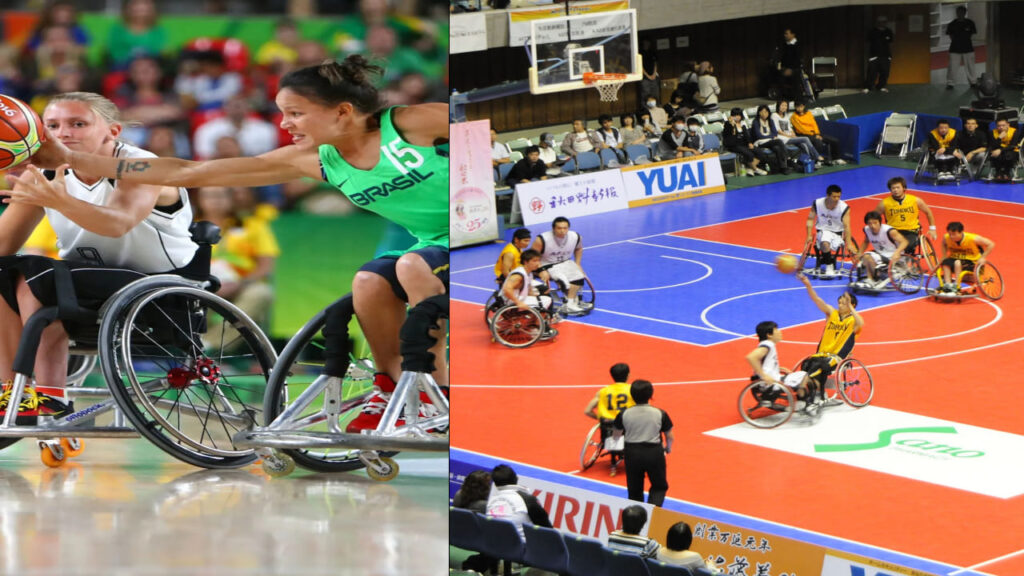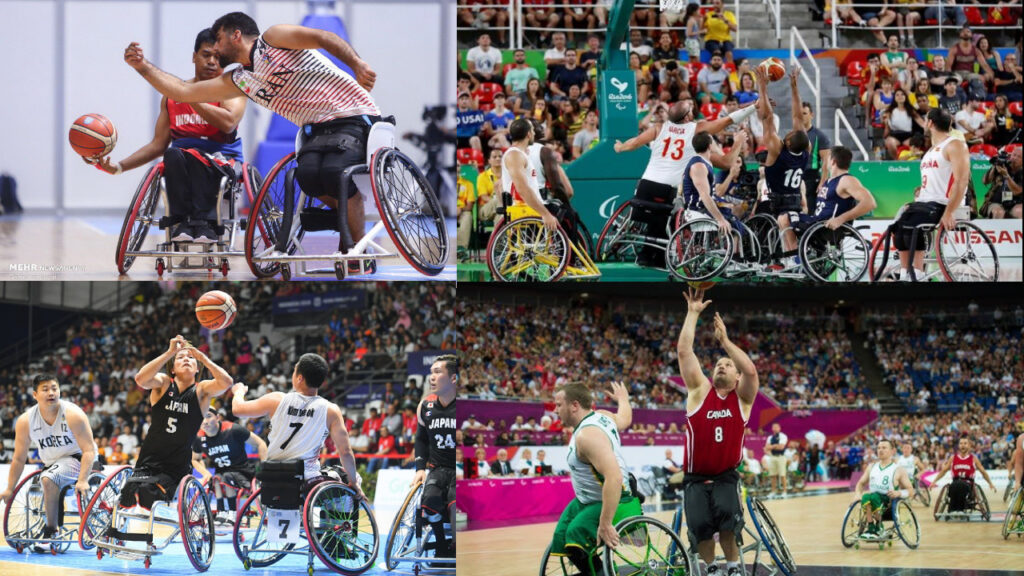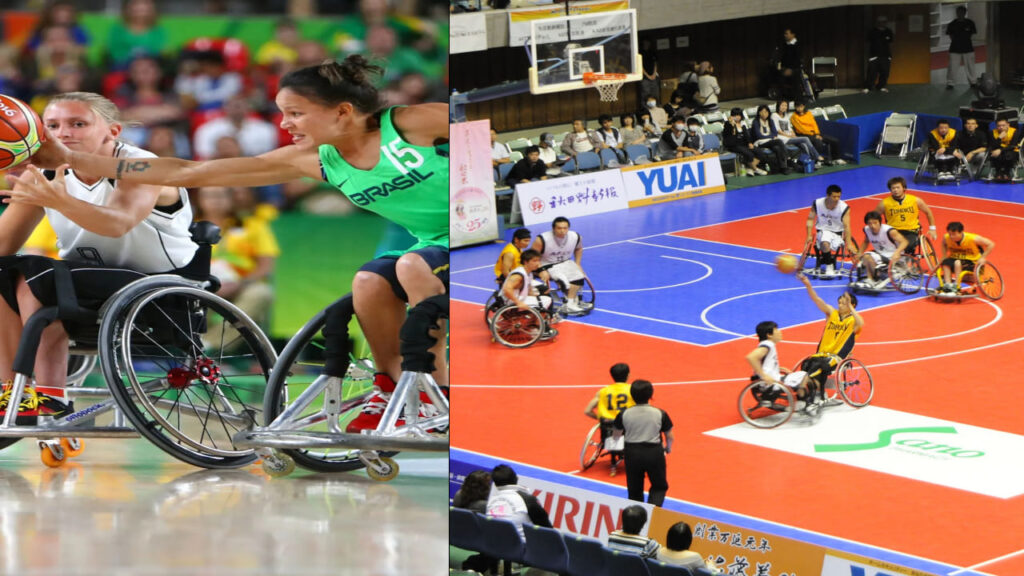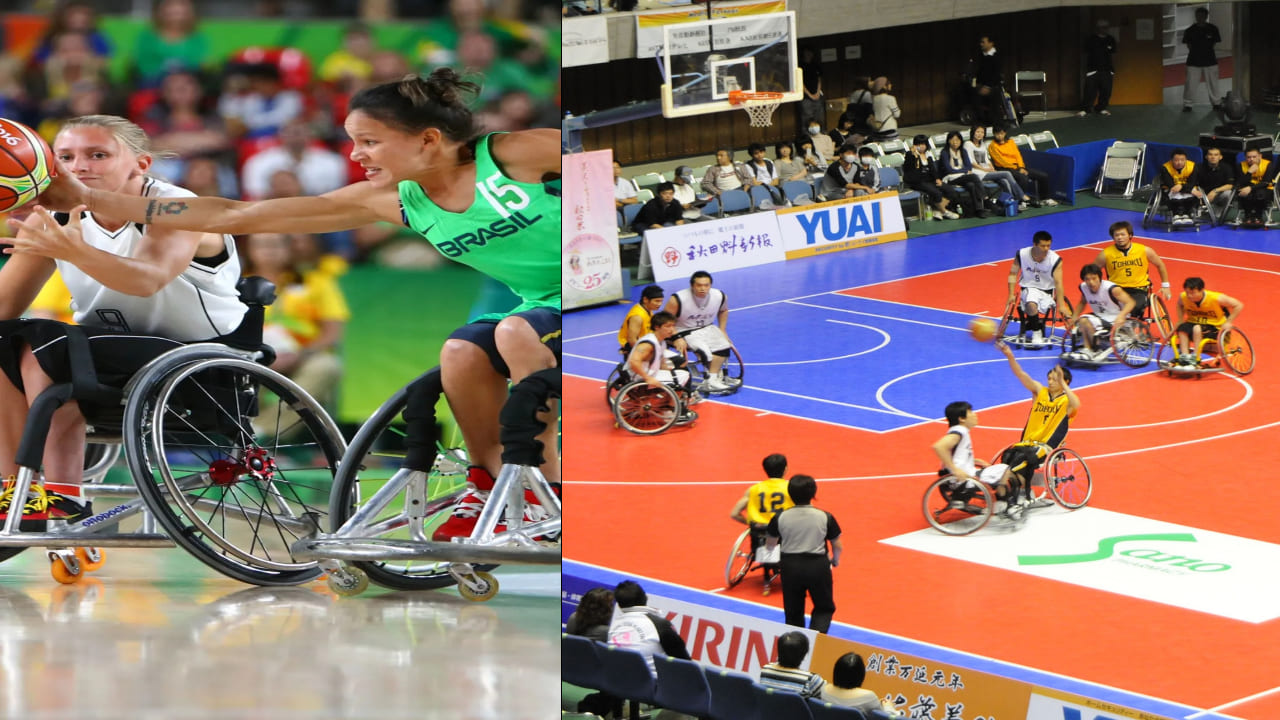Wheelchair basketball
Wheelchair basketball in the Paralympics is truly an incredible sport! It shows great skill, teamwork, and athleticism. The level of competition and determination among the athletes is truly impressive.

How is wheelchair basketball played?
Wheelchair basketball is a fast-paced and highly competitive sport that closely resembles traditional basketball but is adapted for athletes with physical disabilities. Here’s an overview of how it’s played:
1. Court and Equipment:
- Court: The game is played on a standard basketball court with the same dimensions and markings.
- Hoop: The basket is the same height as in able-bodied basketball, 10 feet (3.05 meters) from the floor.
- Wheelchair: Players use specially designed sports wheelchairs that are lightweight and allow for quick movements and agility.
2. Teams:
- Players: Each team has five players on the court at a time.
- Classification: Players are classified based on their physical abilities. Each player is given a point value ranging from 1.0 (most severe impairment) to 4.5 (least severe impairment). A team on the court cannot exceed a total of 14 points.
3. Game Rules:
- Dribbling: Players must dribble the ball after every two pushes of their wheelchair. This is similar to the rule in traditional basketball where a player must dribble the ball when moving.
- Scoring: Points are scored by shooting the ball through the opponent’s hoop. The scoring system (2 points for a field goal, 3 points for a three-pointer, and 1 point for a free throw) is the same as in traditional basketball.
- Fouls: Fouls are called similarly to able-bodied basketball, including personal fouls, shooting fouls, and technical fouls.
4. Game Structure:
- Quarters: The game consists of four quarters, each lasting 10 minutes (in international play).
- Overtime: If the game is tied at the end of regulation, an overtime period is played to determine the winner.
- Substitutions: Teams can substitute players freely, similar to able-bodied basketball.
5. Skills and Strategy:
- Wheelchair Maneuvering: Players must have excellent wheelchair handling skills, including the ability to move quickly, change direction, and maintain balance while shooting or passing.
- Passing and Shooting: Accurate passing and shooting are crucial. Players often use a variety of techniques to get the ball into the hoop or to teammates.
- Defense: Defensive strategies involve blocking opponents’ paths, intercepting passes, and contesting shots, all while controlling their wheelchairs effectively.
Wheelchair basketball is not only a physically demanding sport but also one that requires a great deal of strategy and teamwork. The athletes’ ability to perform at such a high level while navigating the court in a wheelchair is nothing short of impressive.

Participating in wheelchair basketball on a large scale can involve various roles, including sponsorship, equipment manufacturing, event organization, and community support. Several companies and organizations are heavily involved in supporting wheelchair basketball, either through sponsorships, partnerships, or product offerings. Here are some ways companies can participate:
1. Sports Equipment Manufacturers:
- Ottobock: A global leader in prosthetics and wheelchair technology, Ottobock provides high-quality sports wheelchairs specifically designed for wheelchair basketball. They often sponsor events and athletes.
- RGK Wheelchairs: Known for their custom-made sports wheelchairs, RGK is a major player in the wheelchair basketball world, providing athletes with specialized equipment.
- Top End (by Invacare): Top End offers a range of sports wheelchairs designed for basketball, with options for different skill levels and classifications.
2. Apparel and Sportswear Brands:
- Nike, Adidas, and Under Armour: These global sportswear giants often sponsor Paralympic athletes and teams, providing them with apparel, footwear, and sometimes financial support. They can also create specialized clothing and gear for adaptive sports.
3. Event Sponsors and Organizers:
- Toyota: Toyota is a major sponsor of the Paralympic Games and supports adaptive sports events, including wheelchair basketball, through financial backing and promotional activities.
- Visa, Coca-Cola, and Panasonic: These companies are long-time supporters of the Paralympic Games and often sponsor specific sports, including wheelchair basketball. They can provide funding, marketing, and visibility to the sport.
4. Technology and Innovation Companies:
- SAP: SAP has been involved in providing data analytics for sports, including Paralympic events. They can enhance the fan experience and provide insights for teams and coaches.
- Microsoft and IBM: These tech giants can participate by offering technological solutions that improve the training, performance analysis, and overall experience of wheelchair basketball players.
5. Healthcare and Rehabilitation Companies:
- Zimmer Biomet: Specializing in musculoskeletal healthcare, companies like Zimmer Biomet can contribute by providing expertise in rehabilitation and sponsoring athletes in wheelchair sports.
- Stryker: As a medical technology company, Stryker can participate by supporting adaptive sports through product development and sponsorship.
6. Media and Broadcasting:
- NBCUniversal: As a major broadcaster of the Paralympic Games, NBCUniversal can increase the visibility of wheelchair basketball through extensive coverage and promotion.
- ESPN: ESPN often features adaptive sports in its programming, providing a platform for wheelchair basketball to reach a wider audience.
7. Corporate Social Responsibility (CSR) Programs:
- Local Businesses and Global Corporations: Many companies can get involved in wheelchair basketball by sponsoring local teams, funding community programs, and supporting grassroots initiatives. This can include anything from financial support to volunteer efforts.
8. Travel and Hospitality:
- Marriott International and Hilton: Hotels and hospitality chains can participate by sponsoring events, offering accommodation for athletes and teams, or providing facilities for training and competitions.
By engaging in these ways, companies can significantly impact the growth and development of wheelchair basketball, helping to elevate the sport to new heights and ensure that it continues to inspire and empower athletes around the world.



